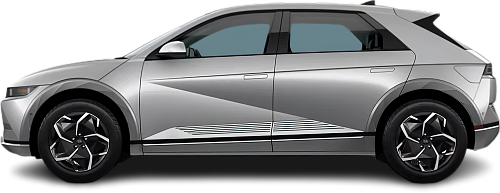Global EV Comparison: Chevrolet Bolt EV Gen 2 vs Hyundai Ioniq 5 Project 45
Struggling to Decide? Let AI Help!
Your AI Summary Is Ready!
General Info
Since both vehicles have been discontinued, they are now only available on the used car market. You can get the Hyundai Ioniq 5 Project 45 (2021) for as low as €33450, while the Chevrolet Bolt EV Gen 2 (2020-2021) was never offered for sale in Europe.
The Chevrolet Bolt EV Gen 2 (2020-2021) is a Hatchback, whereas the Hyundai Ioniq 5 Project 45 (2021) is a SUV.
| Property | Chevrolet Bolt EV Gen 2 | Hyundai Ioniq 5 Project 45 |
|---|---|---|
| Years of Production | 2020-2021 | 2021-2021 |
| Current Status | Discontinued | Discontinued |
| Country of Manufacture | USA | Indonesia, Singapore, South Korea |
| Body Style | Hatchback | SUV |
| Market Availability | USA | EU |
| Price Europe (Used) | - Price Europe (Used) | €33450 |
| GCC Score | 5.2 | 6.8 |
Range and Efficiency
Even though the Hyundai Ioniq 5 Project 45 (2021) has a larger battery, the Chevrolet Bolt EV Gen 2 (2020-2021) higher energy efficiency results in a longer real-world driving range.
| Property | Chevrolet Bolt EV Gen 2 | Hyundai Ioniq 5 Project 45 |
|---|---|---|
| Range (EPA) | 417 km | - Range (EPA) |
| Range (WLTP) | - Range (WLTP) | 430 km |
| Range (GCC) | 396 km | 366 km |
| Battery Capacity (Nominal) | 66 kWh | 72.6 kWh |
| Battery Capacity (Usable) | 62.7 kWh | 70 kWh |
| Efficiency per 100 km | 15.8 kWh/100 km | 19.1 kWh/100 km |
| Efficiency per kWh | 6.32 km/kWh | 5.23 km/kWh |
| Range and Efficiency Score | 7.5 | 6 |
Charging
The Hyundai Ioniq 5 Project 45 (2021) features an advanced 800-volt architecture, whereas the Chevrolet Bolt EV Gen 2 (2020-2021) relies on a standard 400-volt system.
The Hyundai Ioniq 5 Project 45 (2021) offers faster charging speeds at DC stations, reaching up to 221 kW, while the Chevrolet Bolt EV Gen 2 (2020-2021) maxes out at 50 kW.
The Hyundai Ioniq 5 Project 45 (2021) features a more powerful on-board charger, supporting a maximum AC charging power of 11 kW, whereas the Chevrolet Bolt EV Gen 2 (2020-2021) is limited to 7.2 kW.
| Property | Chevrolet Bolt EV Gen 2 | Hyundai Ioniq 5 Project 45 |
|---|---|---|
| Max Charging Power (AC) | 7.2 kW | 11 kW |
| Max Charging Power (DC) | 50 kW | 221 kW |
| Architecture | 400 V | 800 V |
| Charge Port | CCS Type 1 | CCS Type 2 |
| Charging Score | 4.4 | 7.5 |
Performance
The Chevrolet Bolt EV Gen 2 (2020-2021) is front-wheel drive, while the Hyundai Ioniq 5 Project 45 (2021) offers an all-wheel drive system.
The Hyundai Ioniq 5 Project 45 (2021) boasts greater motor power and accelerates faster from 0 to 100 km/h.
| Property | Chevrolet Bolt EV Gen 2 | Hyundai Ioniq 5 Project 45 |
|---|---|---|
| Drive Type | FWD | AWD |
| Motor Type | PMSM | PMSM (front), PMSM (rear) |
| Motor Power (kW) | 150 kW | 225 kW |
| Motor Power (hp) | 201 hp | 302 hp |
| Motor Torque | 360 Nm | 605 Nm |
| 0-100 km/h | 7.2 s | 5.2 s |
| Top Speed | 146 km/h | 185 km/h |
| Performance Score | 3.5 | 5.2 |
Dimensions
The Hyundai Ioniq 5 Project 45 (2021) is longer and wider, but about the same height as the Chevrolet Bolt EV Gen 2 (2020-2021).
The Hyundai Ioniq 5 Project 45 (2021) boasts a more extended wheelbase.
| Property | Chevrolet Bolt EV Gen 2 | Hyundai Ioniq 5 Project 45 |
|---|---|---|
| Length | 4166 mm | 4635 mm |
| Width (with Mirrors) | 2039 mm | 2152 mm |
| Width (w/o Mirrors) | 1765 mm | 1890 mm |
| Height | 1595 mm | 1605 mm |
| Wheelbase | 2601 mm | 3000 mm |
Cargo and Towing
The Hyundai Ioniq 5 Project 45 (2021) features a larger trunk, but the Chevrolet Bolt EV Gen 2 (2020-2021) offers greater maximum cargo capacity when the rear seats are folded.
A frunk (front trunk) is available in the Hyundai Ioniq 5 Project 45 (2021), but the Chevrolet Bolt EV Gen 2 (2020-2021) doesn’t have one.
The Hyundai Ioniq 5 Project 45 (2021) has a towing capacity of up to 1600 kg, whereas the Chevrolet Bolt EV Gen 2 (2020-2021) is not officially rated for towing in the EU.
| Property | Chevrolet Bolt EV Gen 2 | Hyundai Ioniq 5 Project 45 |
|---|---|---|
| Number of Seats | 5 | 5 |
| Curb Weight | 1616 kg | 2095 kg |
| Cargo Volume (Trunk) | 479 l | 531 l |
| Cargo Volume (Max) | 1603 l | 1591 l |
| Cargo Volume (Frunk) | - Cargo Volume (Frunk) | 24 l |
| Towing Capacity | - Towing Capacity | 1600 kg |
| Cargo and Towing Score | 4.7 | 7 |




